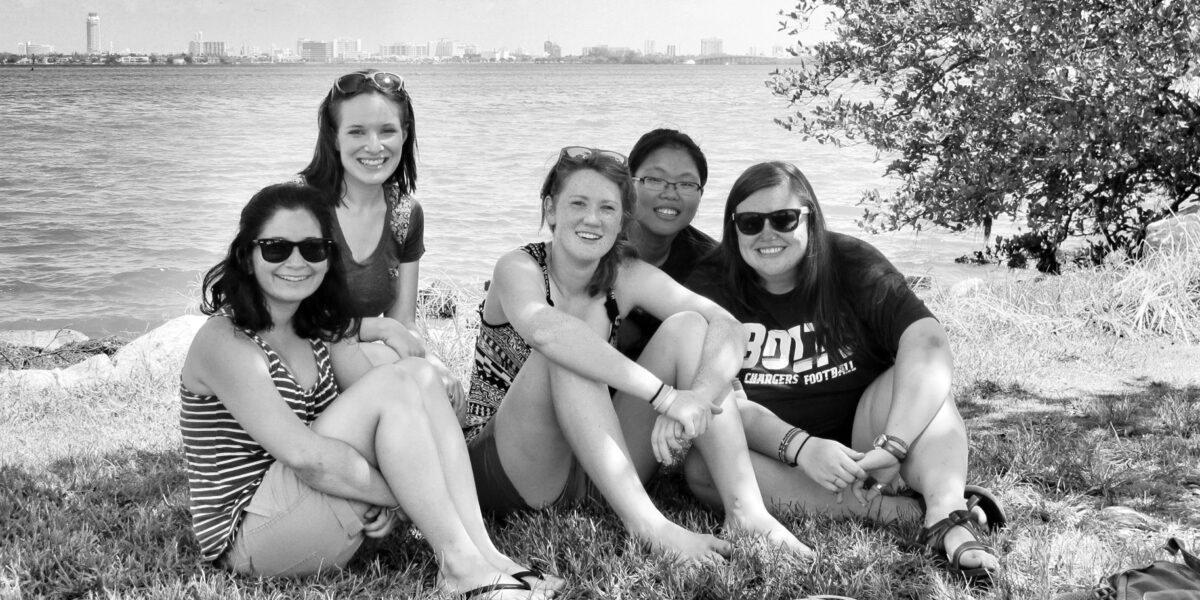ELKHART, Ind. (Mennonite Mission Network) — When the DOOR Dwell term started in Miami in August, five young women unpacked their suitcases and five new cultures and languages that they brought with them.
Miami is known for language diversity because of the city’s mix of white, black, Latino and Caribbean cultures. As they serve a year in the city, the DOOR Dwell participants will represent a microcosm of that diversity.
“A lot of people think of [diversity as only] race, but it’s broader,” said Dwell participant Molly Turner. “Socio-economic status, life experiences, it all contributes to the whole individual.” But when these Dwell participants talk about diversity in their unit house, they talk about the languages they speak, in addition to English.
Turner, from Colorado Springs, Colo., speaks Swahili. Michelle Muñiz-Vega, from San Juan, Puerto Rico, speaks Spanish. Suyeon Kim, from Charlotte, N.C., speaks Korean. Kelly Nevling, from Raleigh, N.C., speaks American Sign Language. Lanier Smith, from Camden, S.C., speaks French.
Since culture and language are so intertwined, each of the languages spoken in the Dwell house give a window into the culture that the language comes from. It can be difficult to fully understand a culture without understanding its language. A Stanford study even suggested that language impacts how we think differently.
“I think languages are super cool,” said Kim. “It opens up a new world, and gives a person a different perspective.”
In sixth grade, Kim moved with her parents from South Korea to North Carolina. At the time, she spoke only Korean. Kim remembers her first days in the United States as if she were in a bubble, not being able to speak her mind or understand instructions and conversations at school. But as time passed, Kim learned English, and her world opened to new possibilities. She gained independence as she interacted in class and served as a translator for her parents at times.
Learning American Sign Language as a second language helped Nevling to better understand the deaf culture. “I had to learn how to not just say words with my hands, but express myself with my hands.” She believes learning another language helped her to express herself more fully.
In the DOOR Dwell unit in Miami, the group is making an effort to learn parts of each language by incorporating words into daily conversation.
But diversity in language can have some real challenges.
Muñiz-Vega noticed that diversity in cultural body language can lead to misunderstandings. Puerto Ricans greet each other with a besito, a kiss and a hug, but that’s not how everyone says hello, said Muñiz-Vega. “It’s weird, to get back from work and not say hello with a kiss and hug.” But she understands the American culture, and is learning not to take it personally.
Turner is challenged with a language barrier at the United Way Center for Financial Stability, where she works. “I meet so many different people who speak Haitian Creyol and Spanish,” Turner said. “I want to help them out, but can’t understand them.” During times like this, she dislikes the power that speaking English gives: the access to knowledge simply because she grew up speaking a certain language.
Each time Turner addresses these language barriers, she mirrors the patience and understanding she sees in Miami’s communities. According to Turner, people take their time, and use body language to speak to each other when words fail them.
The Dwell participants are learning a lot more than a few foreign words this year.
Smith has learned a lot about Haitian culture through the Haitian Creyol language that is spoken in her placement. The culture is engrained in the language, she said. “All of the powerful words are in French, while the everyday words are simple—in Creyol,” which exemplifies the lasting influence that the French occupation had on Haitian culture.
No matter the culture one comes from, Turner believes it is essential to “continually educate yourself in conversation, text, and museums, about the area that you’re in.” Educating oneself about other cultures, instead of making assumptions, helps bridge communication gaps. It’s a way to connect to the cultures you interact with, said Turner.
Above all, Smith believes in the need to “find common ground rather than [focus on] differences, and what brings you into communion with all of humanity.”
###
For immediate release
Mennonite Mission Network, the mission agency of Mennonite Church USA, leads, mobilizes and equips the church to participate in holistic witness to Jesus Christ in a broken world. Media may contact news@mennonitemission.net.







